|
|
|
Sort Order |
|
|
|
Items / Page
|
|
|
|
|
|
|
| Srl | Item |
| 1 |
ID:
120207
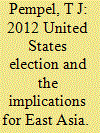

|
|
|
|
|
| Publication |
2013.
|
| Summary/Abstract |
The 2012 election resulted in a major victory for President Obama and while his Democratic Party improved its Congressional strength, the House of Representatives remains under Republican control. The election revealed the depth of America's political and voter divisions with each party showing dramatically different areas of strength and weakness. Yet the election did not hinge on foreign policy leaving the Obama administration likely to continue most of its earlier policies toward East Asia as marked by the multilayered 'pivot' toward Asia. Relations with China and North Korea are likely to remain difficult to manage while US-ROK links should be far smoother. Of particular concern is the economic sluggishness and rising nationalism in Japan which could well cause bilateral problems with the US and regional problems with Japan's neighbors, including US ally, South Korea. And at home the bipolar divisions over how best to deal with America's economic revitalization could well impede US abilities to exert a convincing multi-dimensional role in the region.
|
|
|
|
|
|
|
|
|
|
|
|
|
|
|
|
| 2 |
ID:
173186
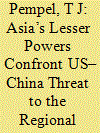

|
|
|
|
|
| Summary/Abstract |
Tensions between the United States and China have been on the rise under Xi Jinping and Donald Trump, challenging longstanding regional moves to peace and prosperity. In response, a number of less powerful East Asian states have taken steps toward deeper regional economic ties and multilateral institutions. This paper analyzes these competing tensions and their implications for the Asia-Pacific regional order.
|
|
|
|
|
|
|
|
|
|
|
|
|
|
|
|
| 3 |
ID:
140684
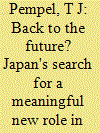

|
|
|
|
|
| Summary/Abstract |
“Is Japan back?” Economically, the evidence is mixed at best due largely to slowness in carrying out vital structural reforms. In electoral terms, the Liberal Democratic Party has regained much of its prior dominance under Abe Shinzo. Most problematic of all, Japan is not back at all in regaining a commanding position within East Asia, in part due to its slow economic transformation, but due also to the atavistic positions taken by Abe’s government on the historical interpretations of Japanese behavior in World War II. KEYWORDS: Abe, Abenomics, structural reform, Liberal Democratic Party, Asian regionalism.
|
|
|
|
|
|
|
|
|
|
|
|
|
|
|
|
| 4 |
ID:
050295
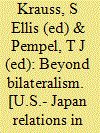

|
|
|
|
|
| Publication |
Stanford, Standford University Press, 2004.
|
| Description |
x, 421p.
|
| Series |
Contemporary issues in Asia and the Pacific
|
| Standard Number |
0804749094
|
|
|
|
|
|
|
|
|
|
|
|
Copies: C:1/I:0,R:0,Q:0
Circulation
| Accession# | Call# | Current Location | Status | Policy | Location |
| 047539 | 327.73052/KRA 047539 | Main | On Shelf | General | |
|
|
|
|
| 5 |
ID:
085523
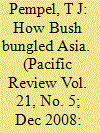

|
|
|
|
|
| Summary/Abstract |
Criticism of the Bush administration's policies in East Asia is hardly common fare. Roseate colors certainly pervade the picture painted by defenders of Bush's policies toward Asia who argue that relations between the US and that region have never been better. This paper shows to the contrary that the Bush administration politicized wide swaths of public policy, including foreign relations, in an effort to create a permanent Republican electoral majority. That effort created a host of failures in America's Asian relations. The article focuses on three central problems: excessive militarization of American foreign policy; economic mismanagement; and a unilateralism that distanced the US from the rising Asian regionalism. The failures are not irreversible however and a change in administration has the potential to revitalize cross Pacific ties.
|
|
|
|
|
|
|
|
|
|
|
|
|
|
|
|
| 6 |
ID:
152246
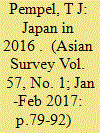

|
|
|
|
|
| Summary/Abstract |
Japanese domestic politics, foreign policy, economics and society continued along well-established paths in the year 2016. And long-term demographic trends remained a major unresolved challenge. Yet three exceptions to continuity stood out: first, controversial legislation that expanded the legality of collective self-defense; second, the likely collapse of the Trans-Pacific Partnership (TPP); and third, the election of Donald Trump.
|
|
|
|
|
|
|
|
|
|
|
|
|
|
|
|
| 7 |
ID:
103426
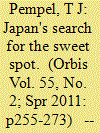

|
|
|
|
|
| Publication |
2011.
|
| Summary/Abstract |
To analyze how Japan's competing objectives and specific policies have been evolving and how they trade off in today's regional security situation, this article argues that shifting Japanese foreign and security policies in Northeast Asia can be understood as ongoing responses to tensions along three key axes. First Japan confronts a tension between bilateralism and multilateralism; second Japan's economic and security interests are often at odds, and third, Japan still struggles with the competing pulls exerted by Asia on the one hand and the West (most particularly the United States) on the other.
|
|
|
|
|
|
|
|
|
|
|
|
|
|
|
|
| 8 |
ID:
102677
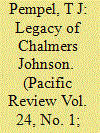

|
|
|
| 9 |
ID:
099073
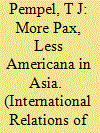

|
|
|
|
|
| Publication |
2010.
|
| Summary/Abstract |
Northeast Asia presents a major theoretical puzzle: the region is rife with security challenges and seems continually poised for horrific military conflicts. Yet, despite many structural tensions, the region has been devoid of significant shooting wars since the signing of the Korean armistice in 1953. This essay examines two major contributions to that pacific condition: first, the pervasive focus on economic development and the growing economic links across the region; and second, the growing number of multilateral institutions within the Asia-Pacific. It concludes that while a 'Pax Americana' was important to peace in the past, the long-term prospects are for the continued absence of overt conflict but in ways that will reflect an overall decline in America's capacity to shape regional developments.
|
|
|
|
|
|
|
|
|
|
|
|
|
|
|
|
| 10 |
ID:
082234
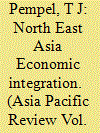

|
|
|
| 11 |
ID:
165156
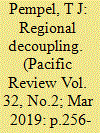

|
|
|
|
|
| Summary/Abstract |
This paper examines the interactions between the USA and the expanding ecosystem of East Asian and Asia-Pacific institutions. Concentrating on the period since the Global Financial Crisis of 2008–2009, it analyzes the ‘rival regionalisms’ that are now mushrooming throughout the region. Critical is the competition between nominally cooperative institutions and continued state-to-state suspicions that handicap efforts to forge regional institutions able to redress the region's most contentious issues. Nonetheless, national mistrust of regional bodies is less evident in areas such as trade and finance where many actors envision the possibility of win-win solutions even as they remain more difficult to envision in issues touching on hard security The paper concludes by exploring what looks to be a new American disengagement from Asia-Pacific regional institutions as a consequence of the presidency of Donald Trump.
|
|
|
|
|
|
|
|
|
|
|
|
|
|
|
|
| 12 |
ID:
085534
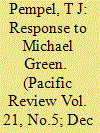

|
|
|
| 13 |
ID:
168512
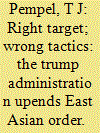

|
|
|
|
|
| Summary/Abstract |
President Donald Trump initiated a tariff war claiming that the ultimate target was mercantile Chinese economic practices. Numerous countries share such concerns about China. Yet the Trump administration’s approach is wrong for at least three big reasons. First, tariffs avoid addressing the most fundamental complaints about China while they undermine the longstanding and beneficial global liberal trade order. Second, the U.S. approach has been unilateral rather than multilateral, weakening America’s bargaining position while alienating close allies. Third, the Trump administration escalates what is an economic challenge into an existential threat, ignoring numerous benefits from Chinese policies as well as ignoring multiple areas where China has been a powerful global partner. Middle powers in Asia have acted collectively and individually to bolster the global trading system and avoid the worst consequences of the Trump actions while seeking to avoid making permanent binary choices between the United States and China. Beyond the immediate problems, the Trump tariff wars are creating, they also generate damaging second order effects that are undermining domestic and regional policies conducive to enhanced American strengths and an economically less mercantilist China.
|
|
|
|
|
|
|
|
|
|
|
|
|
|
|
|
| 14 |
ID:
068574


|
|
|
| 15 |
ID:
096598
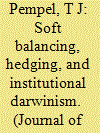

|
|
|
|
|
| Publication |
2010.
|
| Summary/Abstract |
East Asia has increased its formal institutional linkages in both the economic and security arenas. This article addresses three questions concerning this expansion. First, why has the number of institutions increased? Second, why is there so little overlap in the purposes and memberships of these many new bodies? Third, why have most regional institutions achieved such limited policy successes? The article demonstrates that the bulk of the new economic institutions represent collective responses to generalized pressures from globalized finance, whereas the new security bodies deal with regionally endogenous problems of a highly particularistic character. Furthermore, most regional bodies in East Asia still reflect the preeminence of individual state strategies rather than any collective predisposition toward multilateralism per se. East Asian regionalism thus represents a complex "ecosystem" of institutions whose future is likely to see the enhancement of some and the diminution of others through a process referred to here as "institutional Darwinism
|
|
|
|
|
|
|
|
|
|
|
|
|
|
|
|
| 16 |
ID:
187396
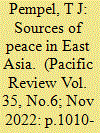

|
|
|
|
|
| Summary/Abstract |
For forty years, the East Asian regional order has delivered widespread peace and prosperity. That order faces possible upending by an economically and militarily more powerful China and a decreasingly robust and engaged United States. While accepting the possibility that such structural shifts could upend the regional order, this paper contends that three powerful counterweights are working to counter disruptive conflicts and to foster peaceful change, namely strong and rising economic interdependence, expanding institutionalization, and active preservation efforts by number of other Asian states, particularly the region’s middle powers. This article analyzes the contribution of these three forces to creating the existing order and to their roles in its continuation.
|
|
|
|
|
|
|
|
|
|
|
|
|
|
|
|
|
|
|
|
|